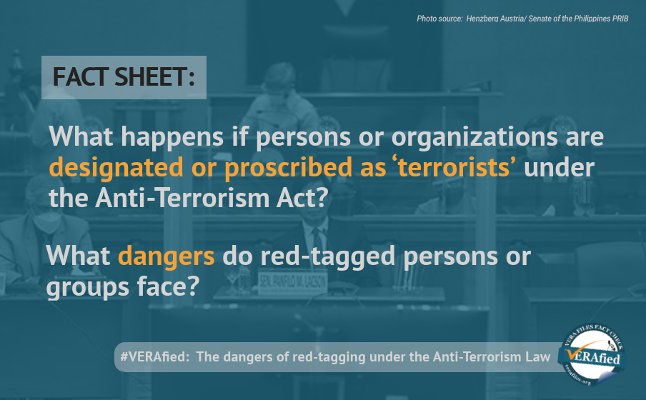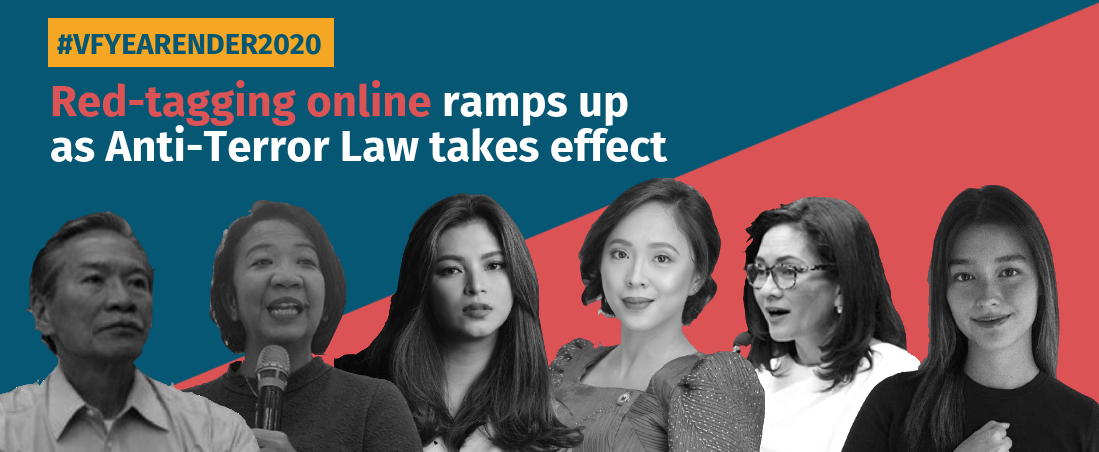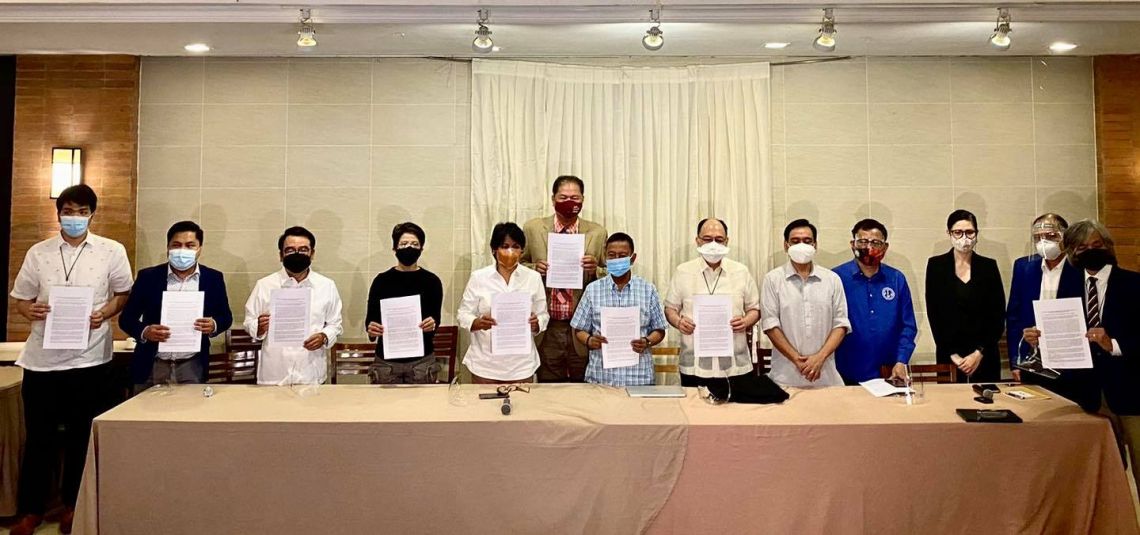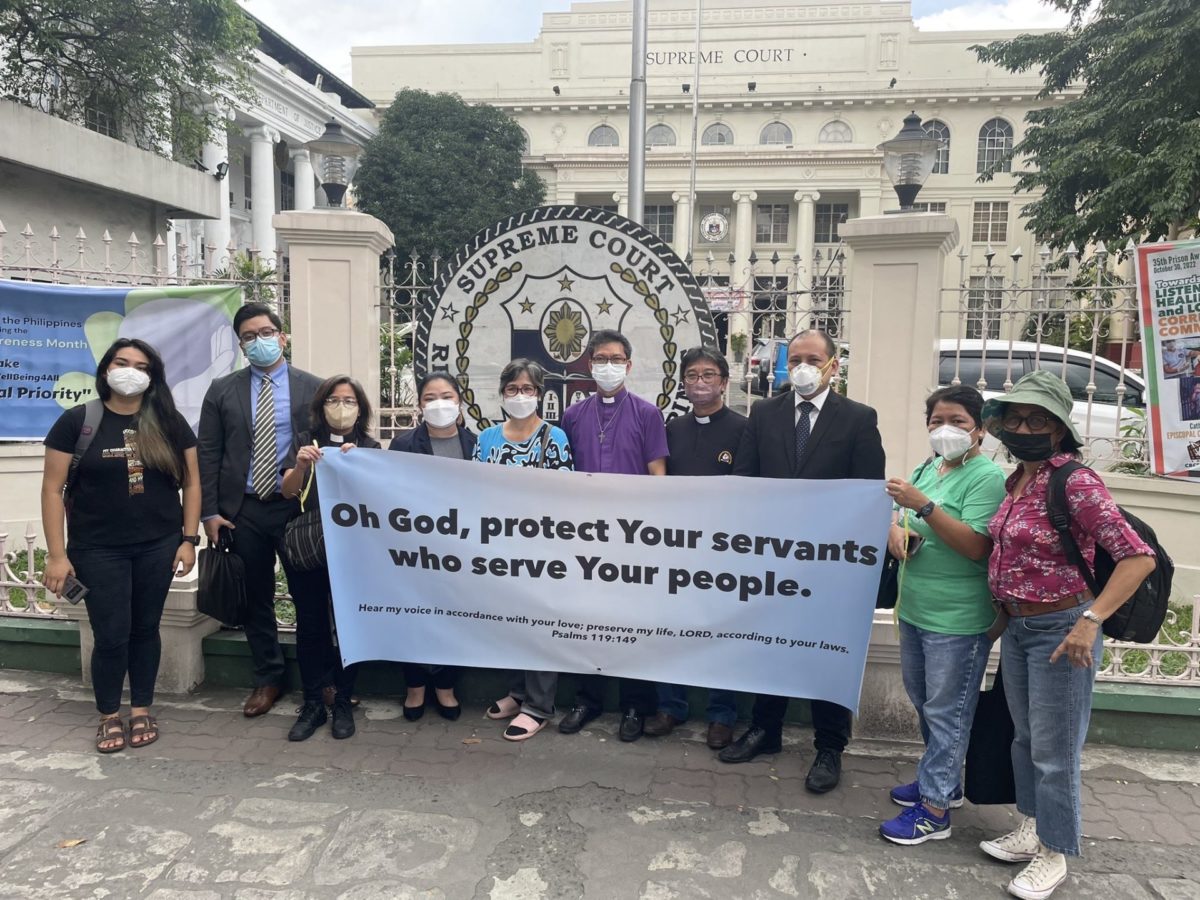In his Nov. 30 public address, President Rodrigo Duterte said he was not “red-tagging” the left-wing groups Makabayan, Gabriela, and Bagong Alyansang Makabayan (BAYAN) when he accused them of being “legal fronts” and “members” of the Communist Party of the Philippines (CPP), of the New People’s Army (NPA), its military arm, and of the National Democratic Front (NDF), its political arm.
Two weeks prior, Communications Undersecretary Lorraine Badoy, concurrently spokesperson of the National Task Force to End Local Communist Armed Conflict (NTF-ELCAC), referred to the League of Filipino Students (LFS) as a “known front of the terrorist CPP-NPA-NDF.” This was when she took a swipe at news outlet CNN Philippines for retweeting the group’s fund drive for victims of the string of typhoons that hit the country.
Badoy went further, insinuating the presence of an “LFS/CEGP cell” in CNN Philippines. CEGP refers to the College Editors Guild of the Philippines.
In late October, Lt. Gen. Antonio Parlade Jr., chief of the Armed Forces of the Philippines (AFP) Southern Luzon Command and spokesperson of NTF-ELCAC, drew flak for his red-tagging statements toward celebrities Liza Soberano, Angel Locsin, and Catriona Gray.
Parlade’s pronouncements put him at the center of a Senate inquiry on red-tagging, in which he insisted that he “did not red-tag” Soberano and other female celebrities.
In the second Senate hearing on Nov. 24, lawmakers such as Rep. Sarah Elago of Kabataan party-list and Rep. Carlos Zarate of Bayan Muna denied the red-baiting allegations. They skipped the Senate red-baiting probe on Dec. 1, a day after Duterte’s tirade.
Supreme Court (SC) Associate Justice Marvic Leonen, in his dissenting opinion in Zarate vs. Aquino III, cited a 2011 journal article that defined red-tagging or red-baiting as:
“the act of labelling, branding, naming and accusing individuals and/or organizations of being left-leaning, subversives, communists or terrorists (used as) a strategy…by State agents, particularly law enforcement agencies and the military, against those perceived to be ‘threats’ or ‘enemies of the State’.”
In October 2018, VERA Files published an explainer on the dangers of being red-tagged under Republic Act No. 9372, or the Human Security Act of 2007 (HSA), which was repealed in July 2020 by RA 11479, or the Anti-Terrorism Act of 2020. (See VERA FILES FACT SHEET: Why ‘red-tagging’ is dangerous)
How is red-tagging different under the Anti-Terrorism Act of 2020 (ATA)? Here are five things you need to know:
1. Is red-baiting the same as terrorist-tagging?
There is “no technical, legal definition of red-tagging and terrorist tagging,” human rights lawyer Gian Miko Arabejo of Alternative Law Groups (ALG) told VERA Files in an email interview on Nov. 9.
Terror-tagging, he said, may be considered a “broader term” to refer to the act of “maliciously” accusing individuals or organizations of being terrorists. On the other hand, “red-tagging” is when persons or organizations are “maliciously accused of being members or associates” of the NPA.
Arabejo added:
“From this definition, we can say that red-tagging is a form of terrorist-tagging. Persons and organizations can be victims of terrorist-tagging without necessarily being red-tagged. For example, Muslim individuals or organizations can be tagged as terrorist without necessarily being accused of being members of the NPA.”
2. What is the legal status of the CPP-NPA in the country?
The CPP-NPA — as one entity — was declared in December 2017 as a “designated/identified terrorist group” by President Rodrigo Duterte through Proclamation No. 374 on the basis of Republic Act (RA) 10168, or the Terrorism Financing Prevention and Suppression Act of 2012. However, it has not been outlawed pending its proscription by the Court of Appeals (CA).
Under RA 10168, a “designated/identified terrorist group” will fall under the jurisdiction of the Anti-Money Laundering Council (AMLC) for the freezing and forfeiture of properties or funds because the law criminalizes financing of terrorism.
Membership in the CPP is not a crime and has not been since 1992 when then president Fidel Ramos repealed RA 1700, or the 1957 Anti-Subversion Law, through RA 7636. The Duterte administration, however, had wanted to revive it purportedly to counter the recruitment of communist rebels among the Filipino youth.
So far, the petition filed by the Department of Justice (DOJ) to officially declare the CPP-NPA as a terrorist organization is still pending at the CA.
DOJ’s petition was previously filed with the Manila Regional Trial Court as required under RA 9372. Following the enactment of the Anti-Terrorism Act of 2020, hearings for the DOJ petition will be “transferred to a division of the [CA] to be authorized by the [SC], according to Sen. Panfilo “Ping” Lacson, principal sponsor and author of the measure.
Under the saving clause of the Implementing Rules and Regulations (IRR) of the Anti-Terrorism Act, released on Oct. 16, all judicial decisions and orders issued, as well as “pending actions relative to the implementation of the [HSA],” will remain valid and effective.
Several groups and individuals have questioned a number of provisions in the Anti-Terrorism Act signed by Duterte on July 3. At least 37 petitions are pending before the SC, contesting the constitutionality of the law. Oral arguments on the legal challenges were set for Jan. 19. 2021.
3. What happens if persons, organizations, or associations are designated or proscribed as ‘terrorists’ under the Anti-Terrorism Act?
RA 11479 provides two levels in which individuals, groups, organizations, or associations may be regarded as “terrorists:” designation, then proscription.
Under the new law, the Anti-Terrorism Council (ATC) — composed of key Cabinet officials, including the executive secretary, national security adviser, and the secretaries of foreign affairs and defense — is empowered to designate persons or entities as “terrorists.”
A person suspected — with probable cause — to have committed, of actually committing, or of attempting to commit an act of terrorism, as defined by the ATA, in the presence of a law enforcement officer or military personnel may be arrested without a warrant and detained for up to 24 days, after which the suspect must be turned over to the proper judicial authority.
In such cases, the nearest court must be notified in writing by the law enforcement agent custodian within 48 hours from the time of arrest. The ATC and CHR must also then be given a copy of the notification given to the judge to “ensure” adherence to the 48-hour requirement.
4. What other dangers do red-tagged persons or groups face?
At worst, red-tagging can lead to warrantless arrests, torture, enforced disappearances, or extrajudicial killings, according to a 2012 study by the International Peace Observers Network (IPON) Philippines, a nonprofit human rights organization based in Hamburg, Germany.
In August 2019, Global Witness, an international nonprofit organization which focuses on protecting human rights and fights environmental abuses by exposing links of conflict and corruption, said continued “red-tagging” of human rights and environmental activists had earned for the Philippines the top spot as the “world’s deadliest country for [environment] defenders” for that year. (See Red tagging puts PH as ‘deadliest country’ for environment defenders: Global Witness)
In April this year, activist Jory Porquia, coordinator of party-list Bayan Muna in Iloilo, was gunned down by unidentified men. In August, peace consultant Randall Echanis, a peasant leader and former chairperson of Anakpawis party-list, was killed inside his home in Quezon City, and was found to have been “tortured” before his death, according to the Commission on Human Rights (CHR). In the same month, Zara Alvarez, a legal worker of Karapatan, a network of human rights defenders in the country, was shot dead in Bacolod City. Alvarez was the 13th human rights worker from Karapatan killed under the Duterte administration, according to the group’s statement.
Following the death of Alvarez, CHR spokesperson Jacqueline Ann de Guia said in a statement:
“CHR stresses, as reflected in its Report on the Situation of Human Right Defenders in the Philippines (2020), that the act of red-tagging of human rights defenders alone already constitutes a grave threat to their lives, liberty, and security. Further, tagging human rights workers and advocates as terrorists distorts the nature of their work and makes them open, legitimate targets to attacks and a number of violations.”
Source: Commission on Human Rights of the Philippines Official Facebook page, Statement of CHR spokesperson, Atty Jacqueline Ann de Guia, on the killing of Zara Alvarez, Aug. 20, 2020
5. What legal remedies are available when ‘tagged’ under the Anti-Terrorism Act?
An individual or group designated or identified as a terrorist may file a “verified request” for delisting before the ATC within 15 days after publication of the designation in a newspaper of general circulation, the online Official Gazette, and the website of the ATC, as required under the IRR.
It may be filed as often as the following grounds are present, but the filing must be done six months from the time of denial of an earlier request. The grounds are:
- mistaken identity;
- relevant and significant change of facts or circumstance;
- newly discovered evidence;
- death of designated person;
- dissolution or liquidation of designated organizations, associations, or groups of persons; or
- any other circumstance showing that the basis for designation no longer exists.
A group or organization may contest the proscription before the CA, Arabejo said. “If successful, the preliminary order of proscription will be lifted,” he added.
In Rule 7 of the IRR, the proscription is considered valid for three years after its publication. Six months before the “permanent order of proscription” is set to expire, the DOJ, as authorized by the ATC and NICA, may “cause [its] review” by filing the appropriate application before the CA.
The CA will then review the application for the reissuance of the proscription and decide whether the permanent order of proscription should be lifted or reissued.
Those who are unlawfully intercepted or arrested without legal grounds may file a writ of habeas data, a judicial remedy to any person whose right to privacy, liberty, or security is violated or threatened by “unlawful act” of a public official in the course of “gathering, collecting, or storing” information about the aggrieved person or party.
“Unfortunately, there are no formal legal procedures” to deal with red-tagging, Arabejo said.
On December 4, Karapatan filed criminal and administrative complaints before the Office of the Ombudsman against high ranking officials of NTF-ELCAC, including National Security Adviser Hermogenes Esperon, Parlade, Badoy, and former Communications undersecretary Margaux “Mocha” Uson, using RA 9851 or the Philippine Act on Crimes Against International Humanitarian Law, Genocide, and Other Crimes Against Humanity. The group said the red-tagging activities of these officials fall under crimes against humanity of persecution.
Editor’s note: VERA Files is one of the petitioners against the Anti-Terrorism Act of 2020 before the Supreme Court.
Sources
Presidential Communications Operations Office, Talk to the People of President Rodrigo Roa Duterte on Coronavirus Disease 2019 (COVID-19), Nov. 30, 2020
RTVMalacanang YouTube, Kumusta Po Mahal Kong Kababayan | Meeting on COVID-19 Concerns and Talk to the People on COVID-19, Nov. 30, 2020
NTF-ELCAC Spokesperson Lorraine Mae T. Badoy Official Facebook, CNN tweeting and retweeting the call for donations of LFS- a known front of the terrorist CPP NPA NDF…, Nov. 13, 2020
CNN Philippines Facebook, READ: CNN Philippines’ official statement on the social media remarks of PCOO Undersecretary for New Media Lorraine Marie T. Badoy, Nov. 14, 2020
Inquirer.net, Stop ‘mansplaining’: Parlade chided for ‘threats’ vs Liza Soberano, other celebrities, Oct. 22, 2020
The New York Times, Outcry in Philippines Over General’s ‘Warning’ to Female Celebrities, Oct. 23, 2020
National Task Force to End Local Communist Armed Conflict Official Facebook, Statement of Lt. Gen. Antonio Parlade Jr. on Liza Soberano being “red-tagged”, Oct. 21, 2020
AFP Southern Luzon Command chief Gen. Antonio Parlade, To our celebrities, keep yourselves informed, Oct. 19, 2020
Atty Joji Alonso Instagram, In a meeting held today between AFP Southern Luzon Command Chief Lt. General Antonio Parlade, Jr., Nov. 14, 2020
ANC 24/7 Facebook page, Miss Universe 2018 Catriona Gray says NTF-ELCAC spokesperson Lt. Gen. Antonio Parlade…., Oct. 28, 2020
Senate of the Philippines, Senate Resolution No. 559: Red-tagging/red-baiting of certain celebrities, personalities, institutions, and organizations, Oct. 28, 2020
Senate of the Philippines YouTube, Committee on National Defense & Security, Peace, Unification and Reconciliation, Nov. 2, 2020
Senate of the Philippines, Committee on National Defense and Security, Peace, Unification and Reconciliation, Nov. 24, 2020
ABS-CBN News Channel Twitter, READ: Bayan Muna Rep. @kaloi_zarate and Kabataan Rep.
@sarahelago to skip third Senate hearing on red tagging, cites need to attend to their duties as House lawmakers, Dec. 1, 2020
Rappler, After Duterte’s tirades, Zarate, Elago skip Senate hearing on red-tagging, Dec. 1, 2020
Inquirer.net, Zarate: Senate ‘red-tagging’ probe becomes ‘venue for witch hunting’, Dec. 1, 2020
Senate of the Philippines, Committee on National Defense and Security, Peace, Unification and Reconciliation, Nov. 30, 2020
Supreme Court of the Philippines e-library, G.R. No. 220028 J. Leonen Dissenting Opinion, Nov. 10, 2015
Official Gazette of the Philippines, Republic Act. No. 9372: Human Security Act of 2007, March 6, 2007
Official Gazette of the Philippines, Republic Act No. 11479: The Anti-Terrorism Act of 2020, July 3, 2020
Personal communication with Atty. Gina Miko Arabejo, Nov. 9, 2020
Has the CPP-NPA been declared a terrorist organization in the country?
- Official Gazette of the Philippines, Proclamation No. 374: Declaring the Communist Party of the Philippines (CPP) – New People’s Army (NPA) as designated/identified terrorist organization, Dec. 5, 2017
- Official Gazette of the Philippines, RA 10168: The Terrorism Financing Prevention and Suppression Act of 2012, July 25, 2012
- Official Gazette of the Philippines, RA No. 7636: Act repealing The Anti-Subversion Act, July 27, 1992
- One News, IRR Makes Anti-Terrorism Act Itself Tamer In Comparison, Lawyers Tell SC, Oct. 27, 2020
- Supreme Court of the Philippines e-Library, RA 1700: Anti-Subversion Act
- Philstar.com, The Anti-Subversion Law, explained, Aug. 13, 2019
- Manila Bulletin, Año calls for the revival of the anti-subversion law, Aug. 13, 2019
- Rappler YouTube, Año says no more revival of anti-subversion law, but…,Sept. 19, 2019
- Senate of the Philippines, Press Release: On the President’s ‘Declaration’ of the CPP-NPA as Terrorists: Opinion, Not Official, July 9, 2020
- Department of Justice of the Philippines, The 2020 Implementing Rules and Regulations of Republic Act No. 11479, otherwise known as The Anti-Terrorism Act of 2020, Oct. 14, 2020
- Inquirer.net, 37 petitions vs Anti-Terrorism Act now pending before Supreme Court, Oct. 23, 2020
- CNN Philippines, 37 petitions vs. anti-terrorism law may be refiled collectively, says solon, Oct. 29, 2020
- Manila Bulletin, Supreme Court to rule swiftly on petitions vs. Anti-Terrorism Act, Oct. 23, 2020
What happens if persons, organizations, or associations are designated and/or proscribed as ‘terrorists’ under the Anti-Terrorism Act?
- United Nations Security Council, United Nations Security Council Consolidated List, Retrieved on Nov. 9, 2020
- Official Gazette of the Philippines, RA 10592: Good Conduct Time Allowance, May 29, 2013
Are there other dangers with red-tagging?
- International Peace Observers Network, Publications – Observer: A Journal on Human Rights Defenders Threatened in the Philippines, Retrieved on Dec. 1, 2020
- Global Witness, About Us
- GMA News Online, Activist shot dead in Iloilo, April 30, 2020
- Manila Bulletin, Veteran activist killed in Iloilo City, April 30, 2020
- Inquirer.net, Slain activist Jory Porquia laid to rest as kin, colleagues cry for justice, May 17, 2020
- Philstar.com, Peace consultant, peasant activist Echanis killed in Quezon City, Aug. 10, 2020
- CNN Philippines, NDFP peace consultant killed in Quezon City home, Aug. 10, 2020
- Rappler.com, Anakpawis chair Randy Echanis killed inside Quezon City home, Aug. 10, 2020
- ANC 24/7 Facebook, CHR details ‘torture’ of Echanis as revealed in autopsy, Aug. 21, 2020
- Philstar.com, Zara Alvarez is our 13th rights worker killed under Duterte admin — Karapatan, Aug. 18, 2020
- Aljazeera, Human rights leader killed in Philippine ‘war against dissent’, Aug. 19, 2020
- Karapatan’s website, Karapatan condemns killing of human rights and health worker Zara Alvarez, Aug. 18, 2020
- Commission on Human Rights of the Philippines Official Facebook page, Statement of CHR spokesperson, Atty Jacqueline Ann de Guia, on the killing of Zara Alvarez, Aug. 20, 2020
What are the legal remedies available when ‘tagged’ under the Anti-Terrorism Act?
- Supreme Court of the Philippines e-library, A.M. No. 08-1-16-SC : The Rule on the Writ of Habeas Data, Jan. 22, 2008
- Karapatan, Press Release: Karapatan files complaint against gov’t officials engaged in red-tagging, Dec. 4, 2020
- Karapatan’s Official Facebook, Today, Karapatan filed criminal and administrative charges…, Dec. 4, 2020
(Guided by the code of principles of the International Fact-Checking Network at Poynter, VERA Files tracks the false claims, flip-flops, misleading statements of public officials and figures, and debunks them with factual evidence. Find out more about this initiative and our methodology.)




